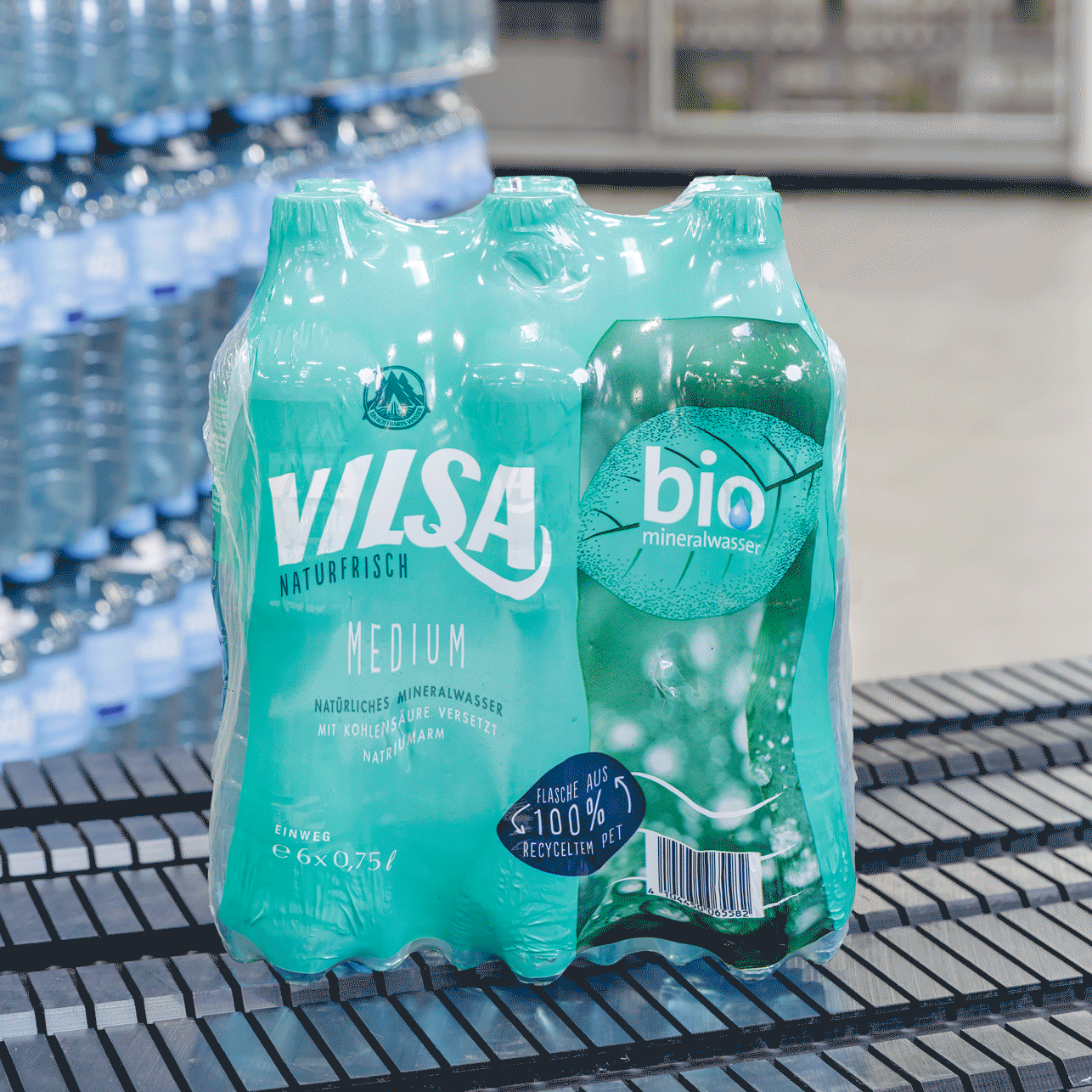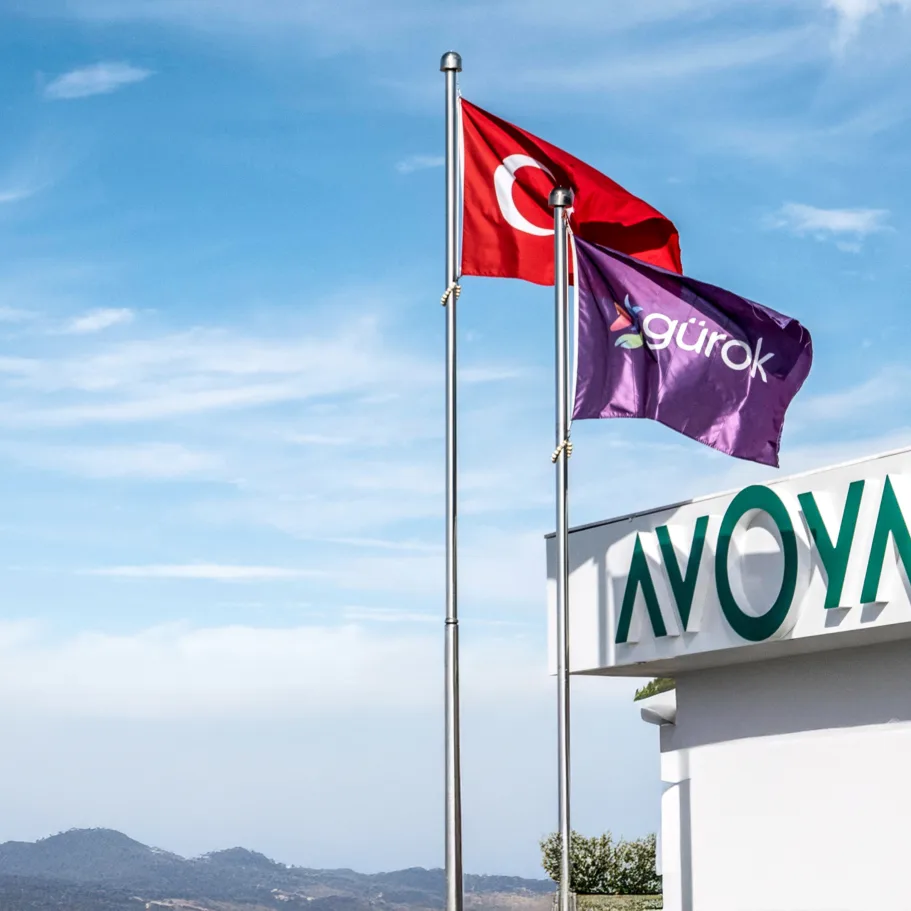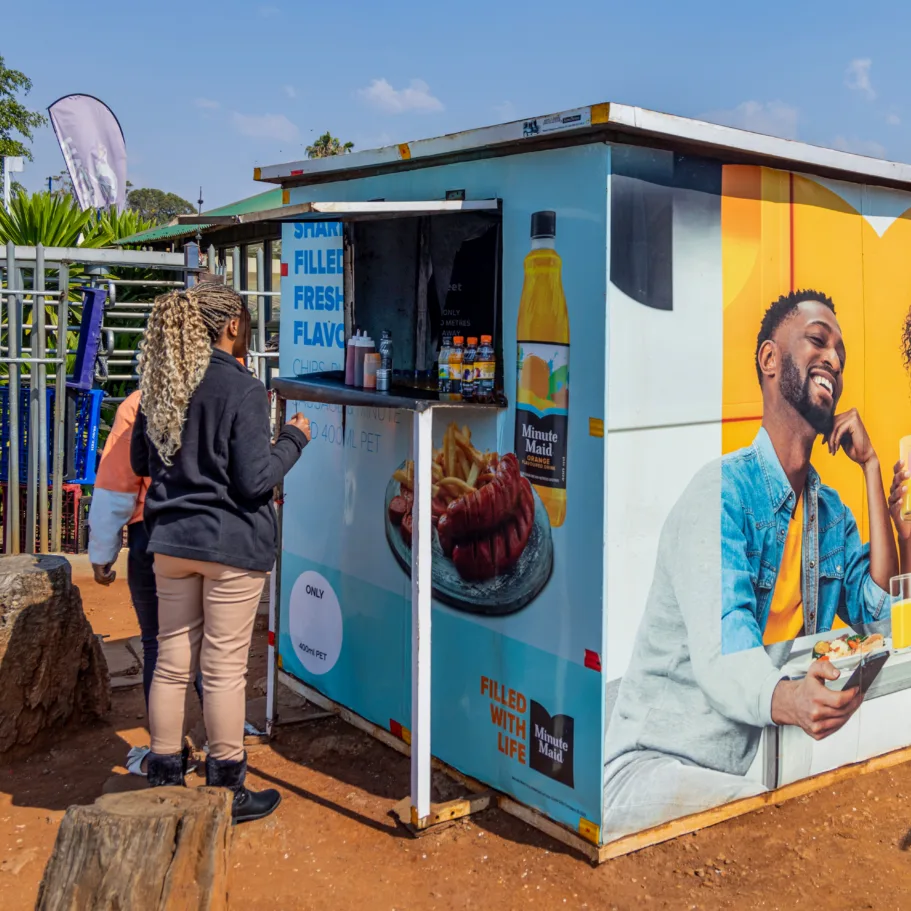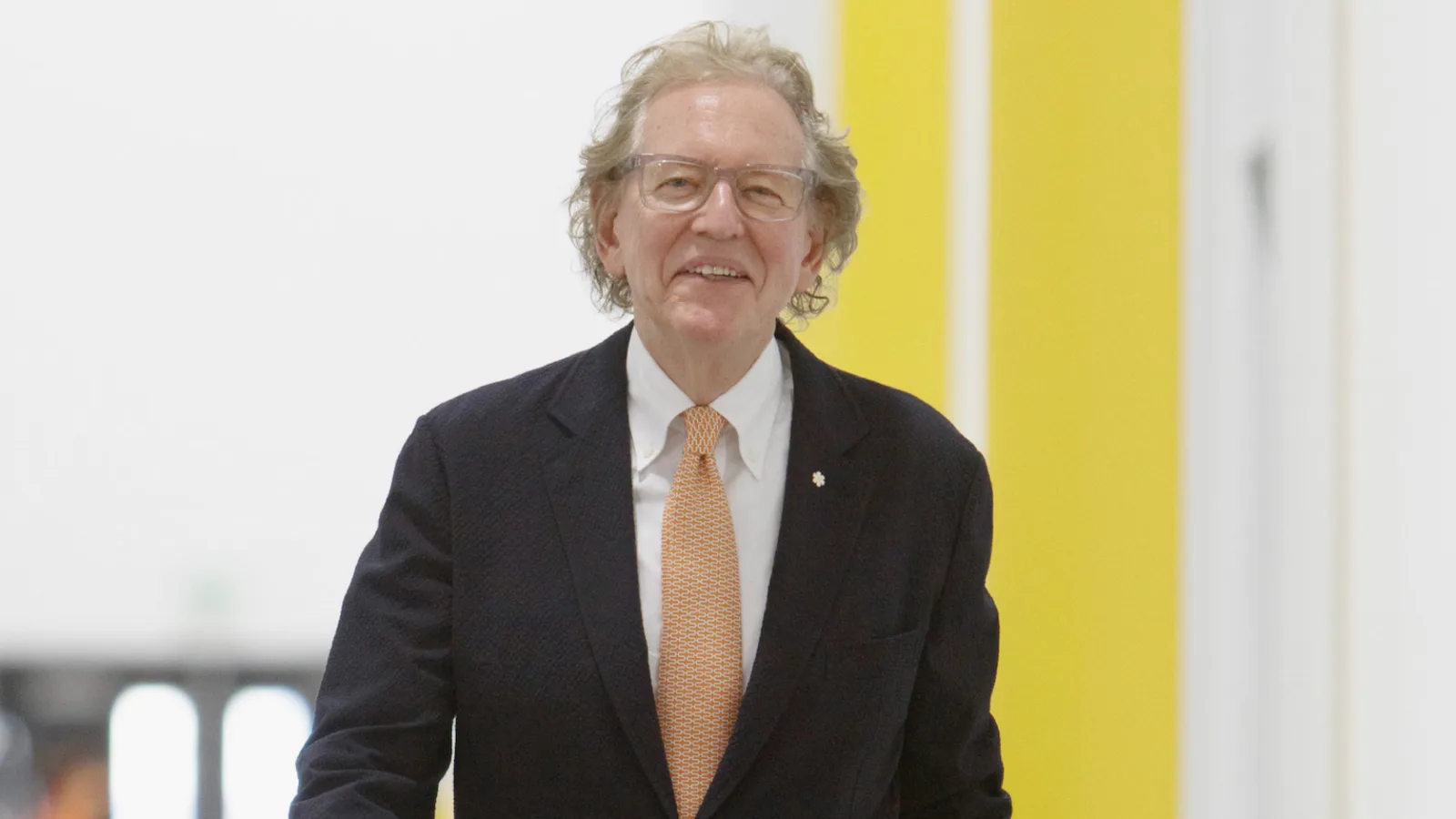
Always one step ahead
Being prepared to push the boundaries and achieve the seemingly impossible is what distinguishes the Mark Anthony Group in the development, production and marketing of its category-leading beverages. The same goes for KHS when it came to implementing a total of three production sites for its client, two of which are real record-breakers.
The recent history of beverage producer Mark Anthony Brewing is one of superlatives – as is that of Mark Anthony Brands, the company responsible for selling and marketing the products. Both belong to The Mark Anthony Group of Companies, a private family-owned business founded by Canadian Anthony von Mandl. On the production side, not one but three ultramodern plants were built from scratch within the space of just 30 months, of which the two greenfield projects in Arizona and South Carolina can claim to be the biggest and most modern breweries to have been constructed in the USA in the last 28 years. On the marketing side, the company has raced from one growth record to the next since first launching Mike’s Hard Lemonade in 1999. Today, Mike’s remains the number one brand and has become an American icon. Numerous other new-to-world brands followed, most notably in 2016 with the launch of White Claw Hard Seltzer, a beverage that has completely transformed the US beer industry (see the box entitled “Triumph of a new brand”). Thanks to its spectacular success, Mark Anthony has literally turned America’s drinking habits upside down. Although a lot of other companies have established themselves in the ready-to-drink segment over the past few years, among them Boston Beer, Molson Coors and even PepsiCo and Coca-Cola, Mark Anthony has maintained a market share of around 45%. Especially among fitness-driven young consumers conscious of their health, hard seltzer scores with its minimal calorie count and low carbohydrate content. Its promise of enjoyment and relaxation “without regrets” has enabled it to assert itself above all over beer and stronger mixed beverages whose market shares have dropped considerably.
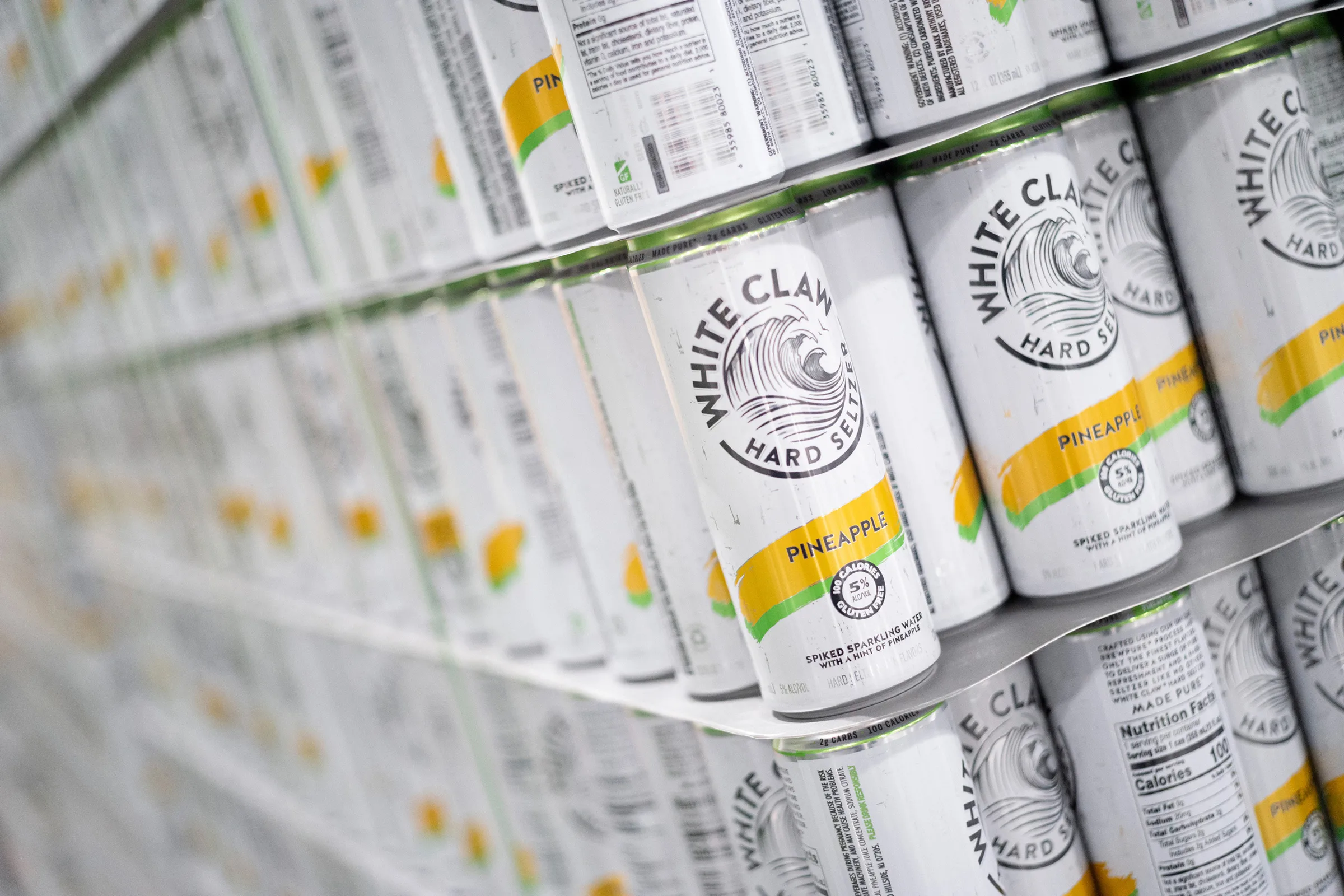
The White Claw brand is a unique success story for the Mark Anthony Group that ‘invented’ a totally new beverage category practically single-handed.
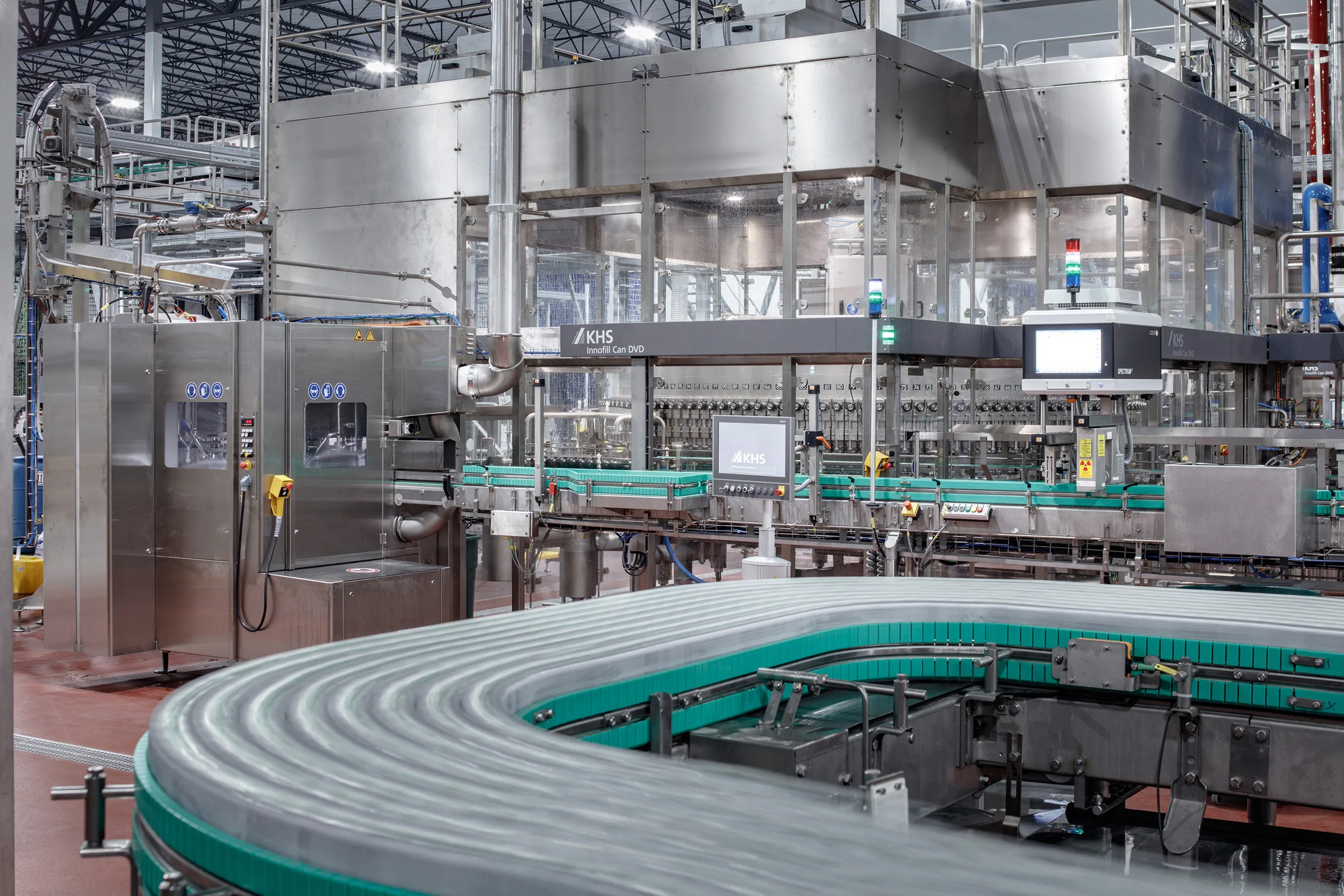
The White Claw brand is a unique success story for the Mark Anthony Group that ‘invented’ a totally new beverage category practically single-handed.
In the first few years Mark Anthony Brewing worked exclusively with contract fillers to produce its hard seltzer. At each co-pack location the company would install millions of dollars in propriety and patented technology to brew and filter its premium alcohol base. In boom year 2019 it became evident that the explosion in demand could only be met by building up its own capacities. One of the main reasons for this is that about half of production is destined for variety packs containing several different flavors. For this purpose, the beverage cans need to be transported from the filling area to a completely different place where they are largely repackaged by hand – an elaborate process during which the containers also risk being damaged.
»We’ve built this factory at Elon Musk speed – there’s never been anything like it in our branch of industry.«
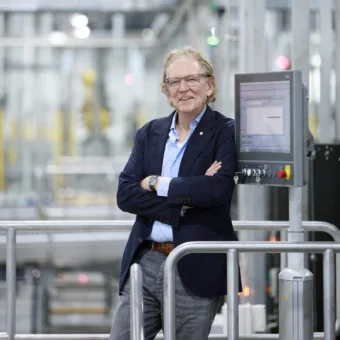
Founder and CEO of The Mark Anthony Group of Companies
Record of success: Anthony von Mandl
Born in Vancouver, Canada, Anthony von Mandl first studied economics before he turned his love of fine wine and luxury wine-country experiences into a life-long career after a period of training in the wine trade – initially by selling imported fine wines from the trunk of his car. At the age of 31 he acquired and built what is now the iconic Mission Hill Family Estate winery in British Columbia’s Okanagan Valley and with it committed himself to transforming the region into a high-end winemaking area of renown. His family company now owns seven iconic and award-winning wine estates, all an expression of his extremely high demand for quality. After initial ventures into the beer trade and brewing, in 1996 his company, now operative under the name of Mark Anthony, launched Mike’s Hard Lemonade in Canada. The unprecedented mixed beverage made of vodka, natural flavorings and carbonated water was an immediate roaring success. Three years later von Mandl launched Mike’s Hard Lemonade on the US market and with it created an entirely new alcoholic beverage category with flavored malt beverages (FMBs) after replacing the spirit with fermented malt. In 2015 he sold the brand rights in Canada to Labatt Breweries and focused on the US market where Mike’s Hard Lemonade continues to be the number one FMB Brand. The unprecedented success of his White Claw Hard Seltzer is a game changer for Mark Anthony, a private, family-owned company that continues to transform the global beverage industry.
Visit to Dortmund
In September 2019 company founder and owner Anthony von Mandl flew from his corporate office in Vancouver, Canada, to Germany. At KHS headquarters in Dortmund he visited the Executive Management Board to sound out a possible cooperation. He was already familiar with the systems supplier from the packaging machines that Mark Anthony had had successfully installed for its co-packers. The chemistry was right and concrete plans were soon being drawn up: besides two canning lines for a brownfield project in Hillside, New Jersey, to be installed in the spring of 2020, the main item on the agenda was a completely new factory on a greenfield site in Glendale, Arizona.
A few weeks later a team then set off for Germany to start work, headed by John Sacksteder, president of Mark Anthony Brewing, and accompanied by Alcides Vieira, CSO of KHS USA. Once in Dortmund they shut themselves in a room together with KHS colleagues from Kleve, Bad Kreuznach and Worms for four days, determined to only leave it again when all of the major technical questions had been clarified and a rough layout for the lines hammered out. “Whereas big breweries take lots of time planning, going right down to the last detail, with Mark Anthony everything had to be very quick,” remembers Vieira. “This was because there was a lot of trust: instead of giving us long lists of specifications, our partners simply said that they could rely on us knowing what needed to be done.” Regarding the required production quantities, it quickly became clear that the plant in Arizona had to include four canning lines and a variety pack repackaging line, among other features.
The contract was awarded in the middle of November. The timing was tight: the first salable product was due to run off the line in July of the following year. “We had to move quickly to get capacity online to meet the growing demand. For most of 2018 and forward, we couldn’t produce enough to keep up,” says John Sacksteder. “We’re a very lean company and Anthony had put us in a position to make decisions quickly. Issues that would take other companies weeks and months to debate we’d resolve in hours and move on. The planning and construction of a project the size of our Glendale plant could take years; we set out to complete it in less than 300 days. At first everyone was speechless. But KHS rose to the challenge – and delivered.”
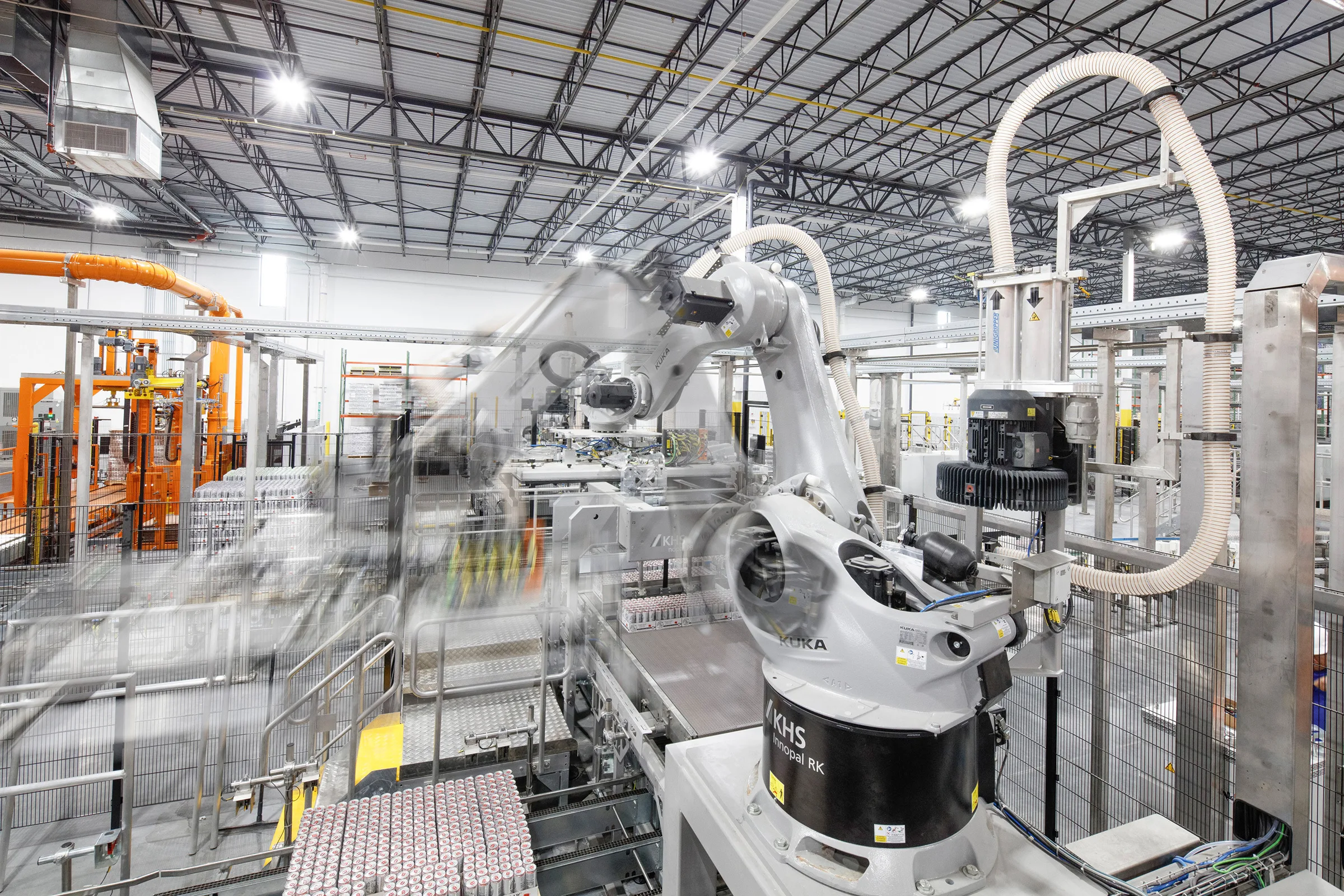
Two KHS Innopal RK robots depalletize the different product types while pushers separate the trays into individual rows.
Best time in Arizona
One aspect that wasn’t factored in from the start was the corona pandemic that hit the world in March 2020. “Covid 19 presented an entirely new challenge for us and all of our partners,” Sacksteder recalls. “How could we keep everyone safe while still moving the project forward on this aggressive timeline? We put strict protocols in place on the worksites and for our meetings; we had video calls in place on a very frequent basis to ensure lines of communication were open and issues were getting resolved quickly.” KHS employees entering the USA from Germany first had to quarantine for two weeks in neighboring Mexico before they could commence work in Glendale. It helped that the KHS organization in the USA is so well staffed that it wasn’t absolutely necessary to only rely on resources from Germany to implement the project. “Of course, no-one’s happy to be confronted with such challenges,” says Vieira. “But finding joint solutions together as partners, as we did with Mark Anthony, was a real joy.”
Despite all of the adverse circumstances, one being the extremely hot climate with temperatures of over 40°C, the factory was actually completed within 280 days – from greenfield to first saleable product. In this time, the entire traffic and utility infrastructure with roads, rails and water and electricity lines was constructed on a site measuring around 93,000 square meters, the production shops were built and all of the technology was delivered, installed and commissioned. Here, among other items KHS contributed four Innofill Can DVD can fillers with Ferrum seamers, four Innopas WICG compact heaters, four Innopack TSP tray shrink packers and various Innopal PB NF and AS N palletizers. In the meantime, 300 employees were hired and trained – first in construction trailers, then in the newly built warehouse and finally on the installed lines.
»Sometimes we felt as if we were flying a plane we hadn’t yet finished building.«
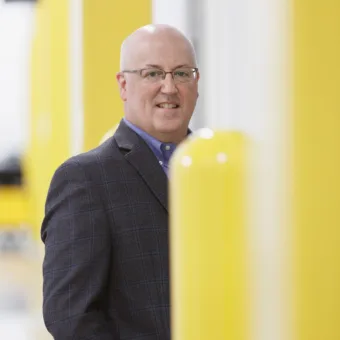
President, Mark Anthony Brewing
Like sparkling water - but sexy: Hard Seltzer
Created by an American in 2012, it wasn’t until the summer of 2019 that the new beverage category became an instant hit in the USA with White Claw from Mark Anthony Brands. Unlike the alcopops, a combination of spirits and soda pop, hard seltzer isn’t actually a mixed beverage in the classic sense but a product that’s brewed, filtered and then flavored. The initial product is usually based on sugar. This is fermented – turning all of the sugar into alcohol – clarified and diluted with carbonated water before fruit flavoring is added. This manufacturing process means that it’s not taxed nearly as highly as spirits and can thus be sold at a lower price – just above that for beer. The beverage is especially popular with health-conscious consumers and fitness enthusiasts. Its alcohol content of 5% is lower than that of mixed drinks and it scores over beer as it has far fewer calories and carbohydrates. Predecessor products such as Mike’s Hard Lemonade – also from Mark Anthony Brands – were based on the fermentation of malt and needed much larger amounts of sugar to mask the accompanying beer taste.
Variety and flexibility
As main product White Claw has always been produced in several different flavors and much of the production is sold in variety packs (cartons containing various flavors), packaging and production planning were important issues. The four KHS canning lines can fill one flavor each at a rate of up to 90,000 cans per hour. These are then either placed on pallets with layer pads and moved to a work-in-progress (WIP) warehouse, where they wait to be repackaged as variety packs of up to six flavors, or they travel directly to the KHS variety pack repackaging line. A third option enables what are known as monopacks to be formed with just one product type. Any combination of the above is also possible. “The design of the lines in Glendale is the most interesting I’ve seen in my 30-year career,” enthuses Vieira. The flexibility required for each conceivable constellation of product type means that the production orders that affect every single part of the system need to be linked up to form over 80 different production scenarios. This calls for extremely sophisticated production planning – and suitably qualified personnel to manage the task. A high degree of automation not only helps to compensate for the lack of specialist workers but also reduces complexity. Mark Anthony relies on the KHS Innoline MES productive system to this end that besides managing and controlling orders also regulates material flows, for which 30 LGVs* are used instead of forklifts that travel through the enormous production shop independently.
* LGVs = laser-guided vehicles.
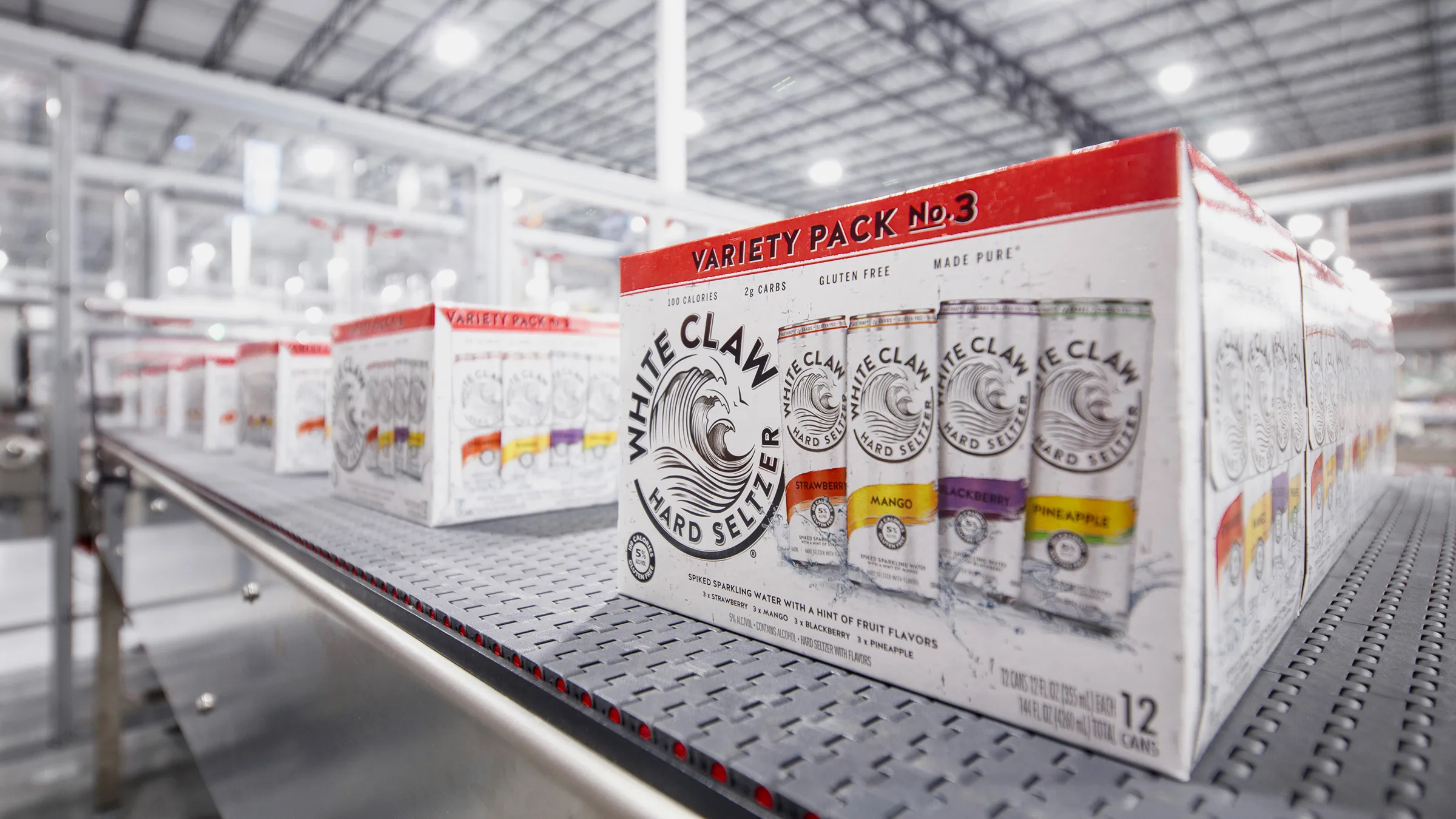
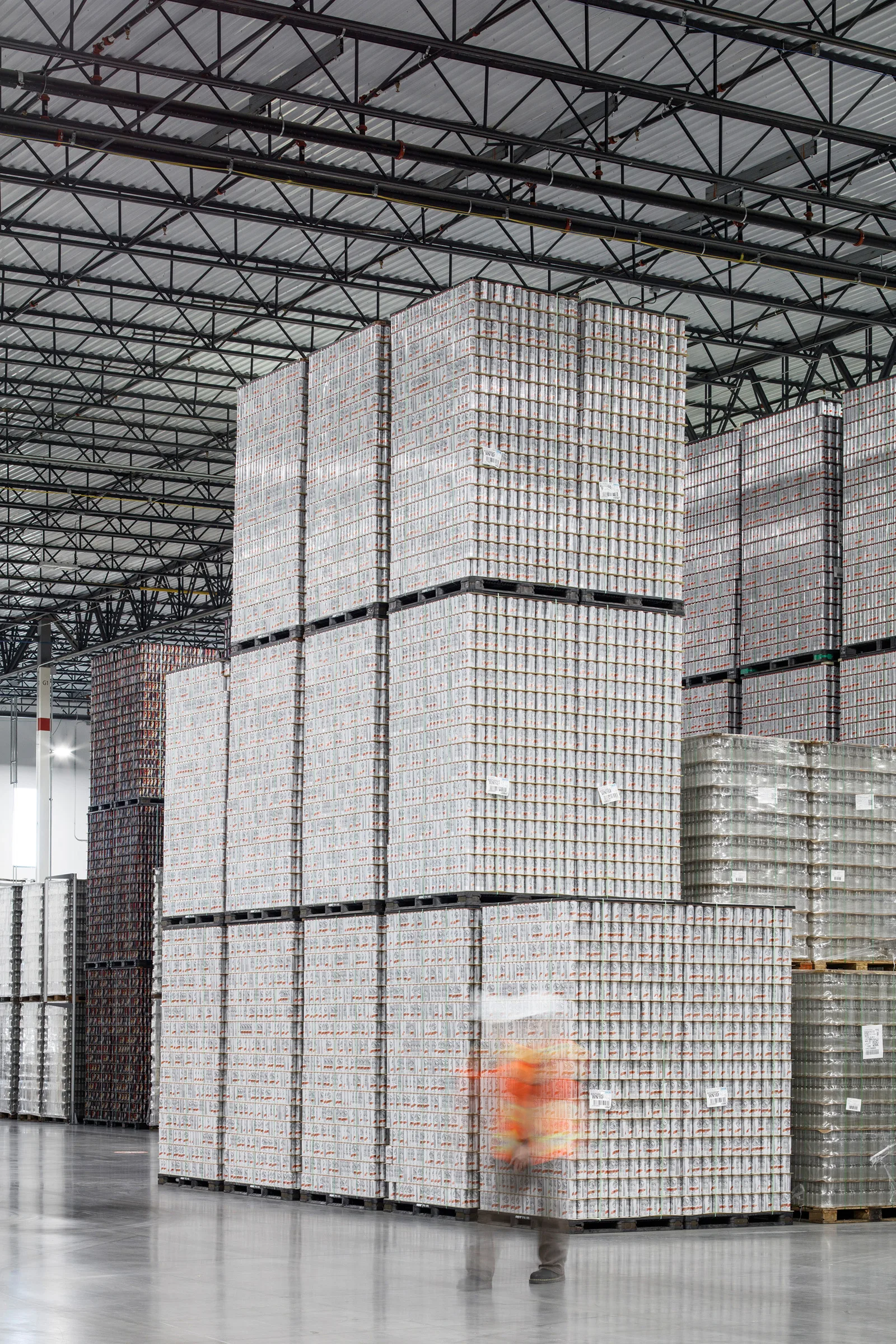
Up to 360,000 cans are filled an hour in Columbia. In the WIP warehouse they wait to be repackaged as variety packs containing up to six different flavors.
Triumph of a success: White Claw
The launch of White Claw Hard Seltzer in 2016 not only marks a revolution in product development but also in marketing. Alongside traditional marketing methods Mark Anthony chiefly makes use of guerilla campaigns, social media and viral marketing tactics. For instance, at the mega Coachella music festival in the spring of 2018 that attracted around 250,000 visitors and has been the biggest livestream event in the world to date, with 41 million watching online, free samples and t-shirts were liberally distributed without White Claw ever being officially mentioned as a sponsor. The festival management even voted the beverage newcomer of the year. Subsequently, memes of white cans branded with a claw-like wave began circulating on the social media networks. In the summer of the following year White Claw became a social phenomenon, when it turned up in a video posted by popular YouTuber and comedian Trevor Wallace, a real hype broke out. On July 4, America’s national Independence Day holiday, everyone in the US was drinking White Claw: at the Super Bowl, on the beach or at a barbecue. There was a shortage of cans on supermarket shelves because White Claw was outselling all of the big beer brands. During the corona pandemic White Claw continued its march of triumph unabated, and is still the number one hard seltzer brand in the US – in a real-life David-versus-Goliath story of success.
New record in South Carolina
Growth proved to be so rapid that even during the construction phase in Arizona in the American Southwest the necessity for a further, even bigger factory to supply the southeast of the country soon arose. After visiting 18 potential sites in five states, Columbia in South Carolina was finally chosen. “The most important criterion for us is that the infrastructure is in place when we start our work: transport links, energy and water supply, wastewater disposal. We need to be sure that we have the full backing of the authorities right from the word go – from the federal state to the county to the town,” Sacksteder explains. “We start by establishing relations at the top with the responsible governor and slowly work our way down. This means that we have commitment and support from each entity, thus allowing us to keep to our schedules and avoid unpleasant surprises.”
Mark Anthony Brewing invested about €460 million in the project covering over 120,000 square meters. KHS installed four more canning lines that are practically identical to the ones in Arizona and that also each have a capacity of up to 90,000 cans per hour. But not everything exactly mirrored the first concept. “We aimed to use the lessons learned from the Hillside and Glendale projects to see what was working and what we felt could make the plant even more efficient,” Sacksteder states. “This is why we not only changed the design of the building itself but also optimized the entire sequence of the project – from the brewing process through mixing to filling. At the same time, we wanted to increase the variety pack packaging speed.” Unlike in Arizona, this was separated from the filling lines where all cans are now initially placed on trays and pallets. Variety packs are then formed with the help of independent repackaging systems. This enables the complexity of the range of variety packs to be separated from that of the filling process. “On our line in Glendale everything is linked together and interdependent. It’s a bit like a Formula 1 car that constantly races at high speed” Vieira claims. By decoupling the two functions, production in Columbia is less intricate and at the same time easier to operate. KHS developed a new machine configuration to produce Mark Anthony’s variety packs that consists of two respective Innopal RK robot palletizers and Innopack PPZ pick-and-place packers, among other machines. Two of these setups were installed in South Carolina and process up to 120,000 cans per hour apiece. The changeover times have also been considerably shortened. Furthermore, in order to further increase efficiency and tempo, greater importance has been attached to automation, with a total of 47 LGVs in operation in Columbia’s production shops.
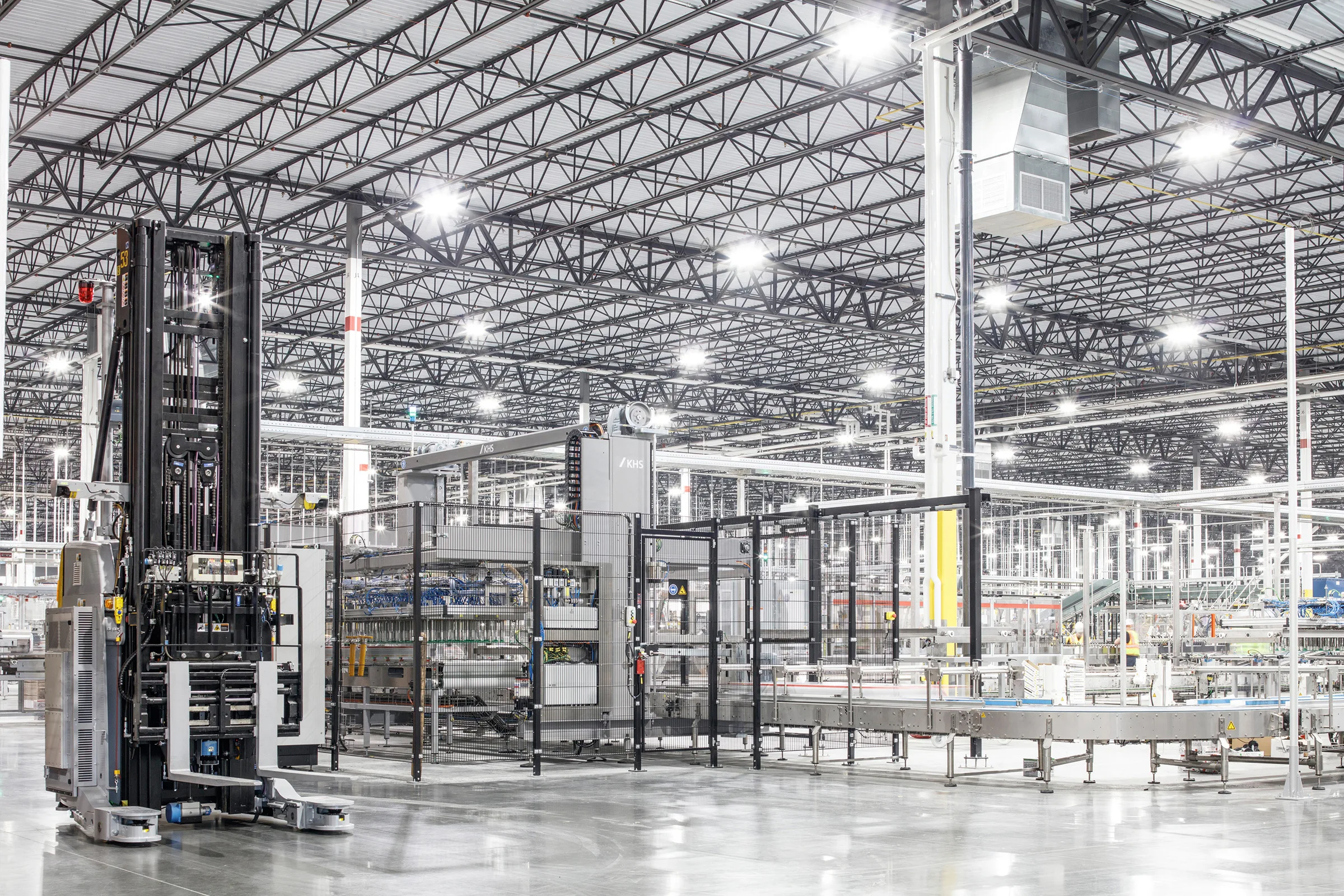
While KHS Innopack PPZ pick-and-place packers place variety packs onto trays in the background, in the foreground a laser-guided vehicle drives independently through the enormous production shops.
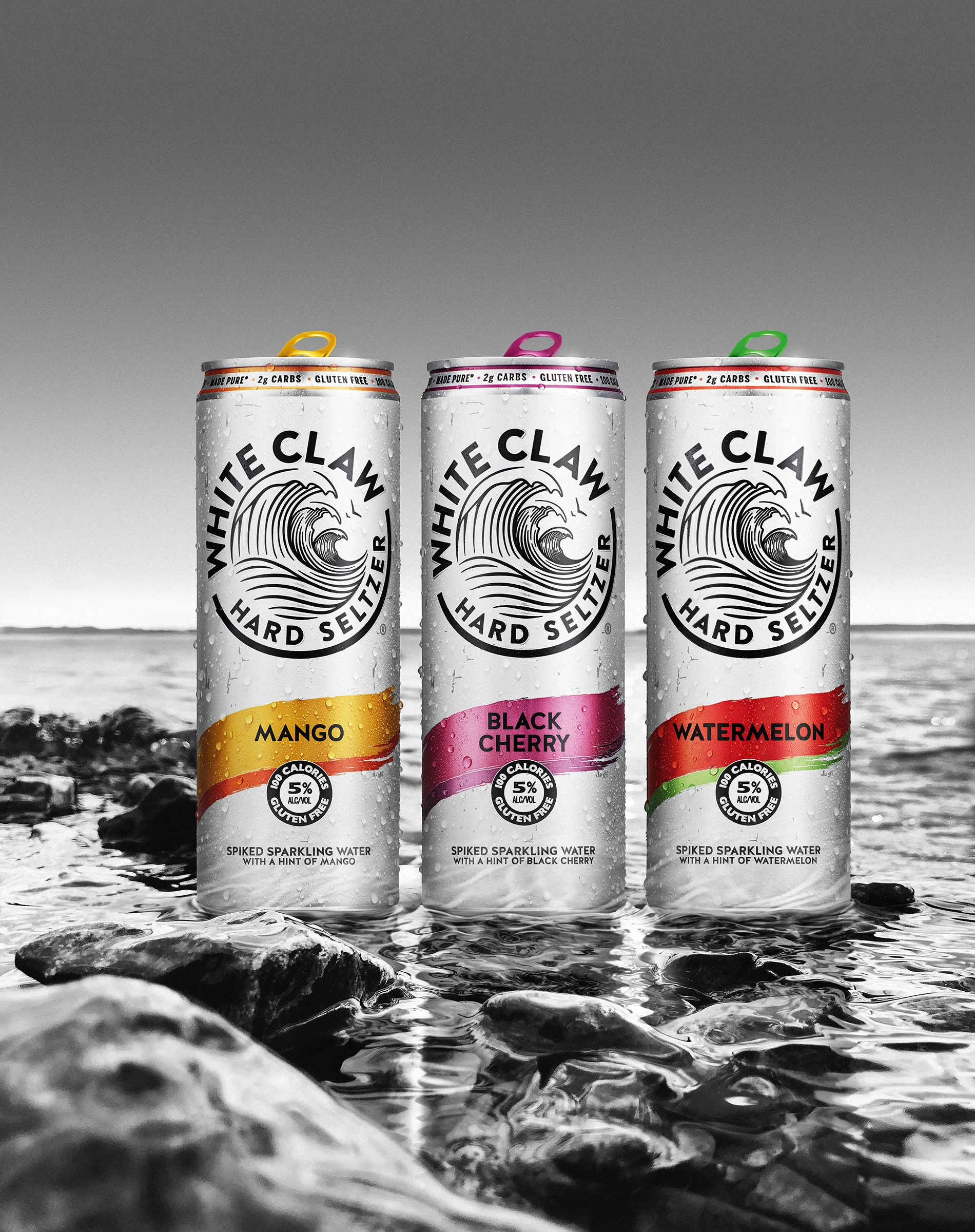
These three current flavors are just a few examples from the wide range of White Claw products.
Achieving the impossible
Thanks to its new sites Mark Anthony Brewing is now the fourth-largest brewery in the United States. At the opening of the newest plant in Columbia, founder and CEO Anthony von Mandl thanked all those involved for their commitment, thus making the impossible possible. “We’ve built this factory at Elon Musk speed, as I like to put it. There’s never been anything like it anywhere in the world in our branch of industry.” And to continue in this metaphor, the Canadian later joked that the plant sees itself as the SpaceX among breweries as regards high-tech.
His close confidant John Sacksteder has undoubtedly made an invaluable contribution here. The president of Mark Anthony Brewing is proud to have completed three ultramodern breweries with a total of 13 lines in just 30 months – at an investment of around €1.3 billion. During this period 650 employees have been contracted and over 100 million packs produced. He sees the fact that Anthony von Mandl entrusted him with managing this task as a unique experience and chance for which he’s extremely grateful – one, he admits, that nevertheless demanded a lot from himself and his colleagues and partners. “The last few years were quite a ride,” Sacksteder laughs. “Just three years ago we were a team of 25; by the end of the year, there’ll be 700 of us. Along the way we sometimes felt as if we were flying a plane we hadn’t yet finished building. It was so critical to us to undertake this journey together with the right partners whose commitment you can rely on 100% – as is the case with KHS.”
